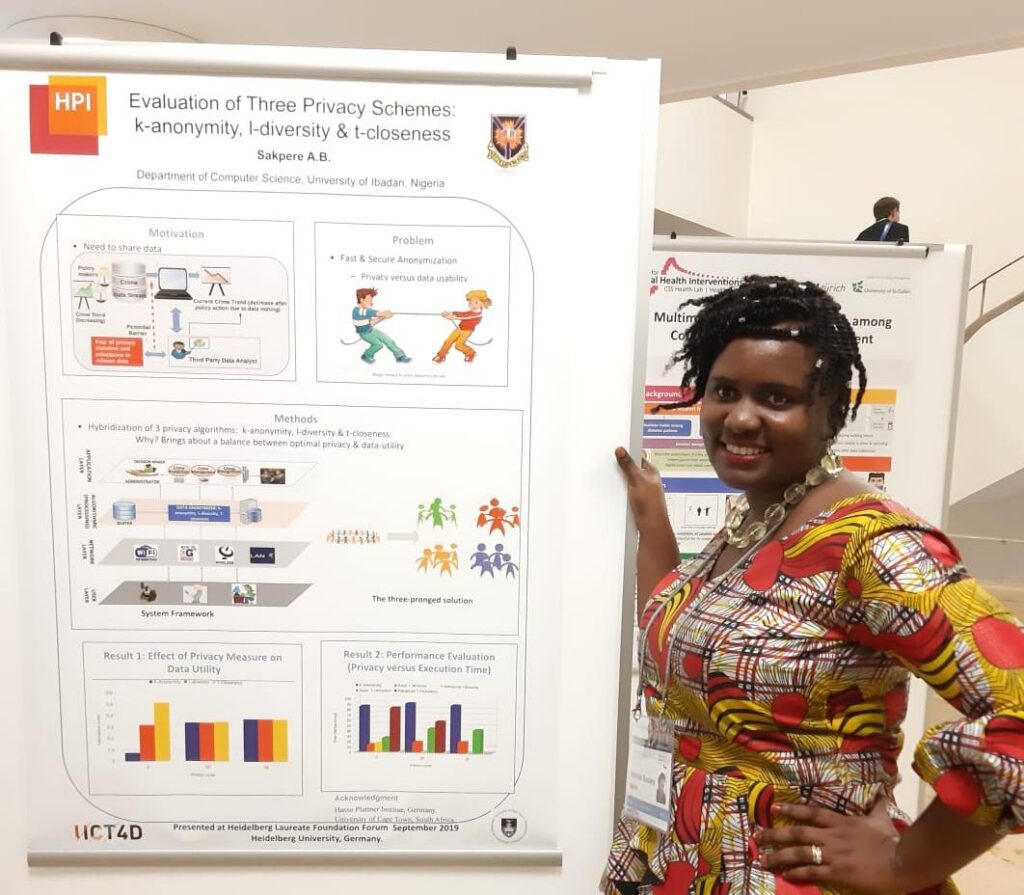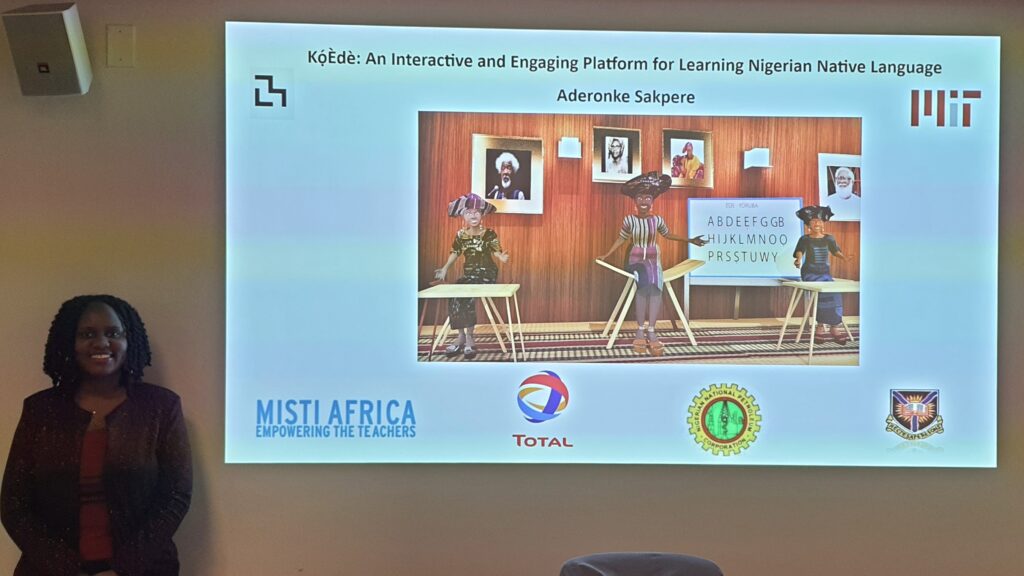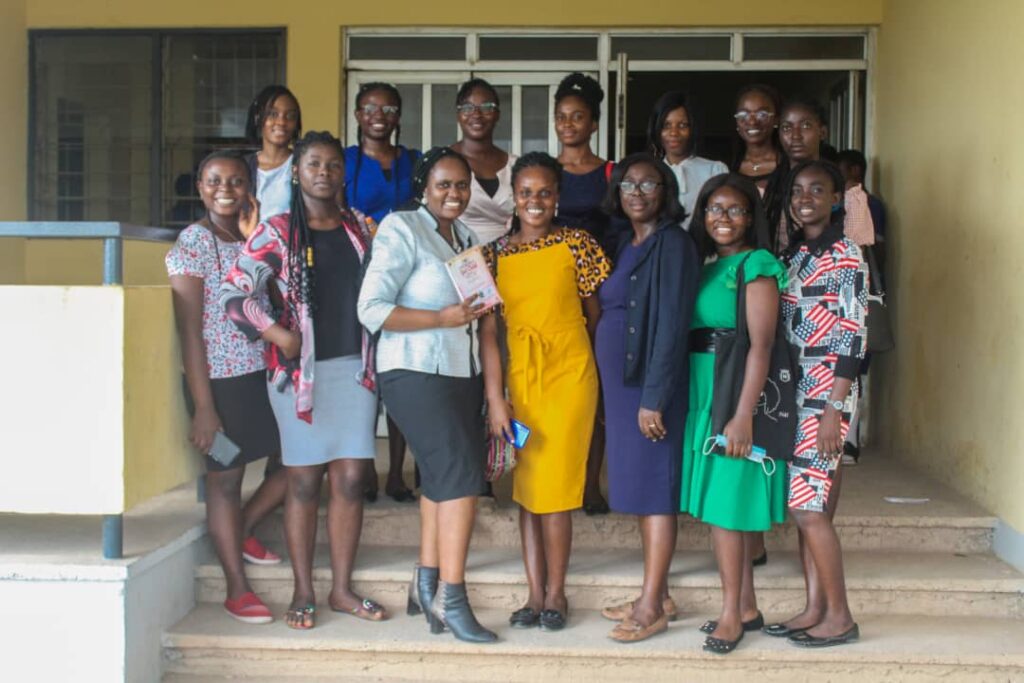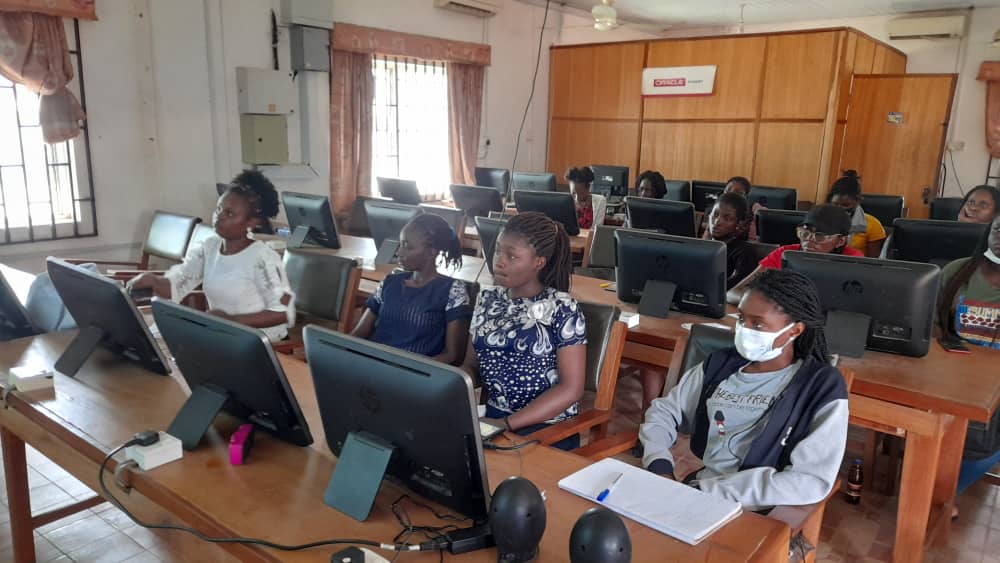HLFF Spotlight – Alumni in Action
BLOG: Heidelberg Laureate Forum

Giving Back to the Community – Aderonke Sakpere
The Heidelberg Laureate Forum has a single purpose: To provide some of the brightest minds in mathematics and computer science with the space and time to make connections and find inspiration. Some of the connections made at the HLF will echo into collaborations and projects, with some of those efforts leading to concrete developments. The HLFF Spotlight series unpacks a few of those examples.
This Spotlight shines on the deeply passionate computer scientist and alumna of the Heidelberg Laureate Forum (HLF), Aderonke Busayo Sakpere from Nigeria. Aderonke holds a PhD in Computer Science from the University of Cape Town, is a former Fellow of the Massachusetts Institute of Technology (MIT) and is currently a lecturer at the University of Ibadan in Nigeria. We sat down with her to talk about two of her ongoing projects: “Kọ́Èdè”, an app to help early childhood learning of her native Yoruba language, as well as the Tech Girls Club, a mentorship program for young women in STEM that she founded in 2019.
There are many reasons an individual might pursue higher learning and a career in research: personal fulfillment, the thrill of discovering something new, financial gain or perhaps recognition by one’s peers and the public. However, to a large degree many do so in order to ultimately try to contribute something of value to society. Such an endeavor can take many forms, whether it is the invention of life-saving medicines or innovative technologies, or simply wanting to educate eager students and thus help pass the torch to a new generation.
These are all expressions of the responsibility many scientists feel towards serving their community, and giving back to those who helped provide opportunities and inspire oneself in the first place. While working in academia – as many researchers can undoubtedly attest to – this can be a difficult goal to keep in focus, as priorities can shift quickly: In a highly competitive atmosphere, oftentimes the pressure is great to publish as many papers as possible, and much time can be consumed with writing grant applications that do not necessarily bear fruit.
As Aderonke tells us during our conversation, part of the illusion of that mindset was peeled away for her when she attended the 7th HLF in 2019, just after she had finished her PhD, and was able to interact with some of the laureates there:
“I could see the passion in them … even though they are advanced in age, they’re still trying to impact the next generation. So it was really insightful, that it’s not just enough to have knowledge.”
“In Nigeria, and also many other universities, what counts is the number of papers you have to get a promotion … If you’re busy applying for grants, busy writing papers, you don’t even have time to give back or to mentor the next generation.”
Aderonke says this really stood out to her in her conversation with Ivan Sutherland, recipient of the ACM A.M. Turing Award:
“One of the things that caught my attention about him … He made us see that when you’re trying to make an impact, it’s not really that you want people to really recognize you. Because if you’re doing it for that thing, it will be at the surface level … but if you’re doing it right from your heart, that’s what makes it more impactful. Because definitely you will face a lot of setbacks, a lot of rejection times, but that deep interest is what would keep you going.”
Kọ́Èdè – Learn Language
In 2020, Aderonke was selected as a Fellow at the Empowering the Teachers (ETT) program at the Massachusetts Institute of Technology (MIT), which strives to help foster young African faculty leadership. As part of one of her courses, she was tasked with designing educational technology for children. Aderonke says she came up with an idea for an educational app that would address a serious issue she says is facing Nigeria – the erosion of its native languages:
“I realized that back home a lot of children don’t speak their native language anymore … [In Nigeria], everybody wants their children to learn English because that’s what is used for communication … People feel like if their kids don’t learn English very well, then they might not have a good life.”
While the official language in Nigeria remains English, owed in great part to its colonial history, it is in fact home to over 500 languages, with some of them – such as Hausa and Aderonke’s native Yoruba – spoken by as many as 48 million and 39.5 million people, respectively. Many of the smaller native languages are often replaced by Nigerian Pidgin, a creole language based on English. However, the Nigerian government has recently reversed an educational policy that previously insisted on using English in schools. Late last year, the government adopted a policy that would mandate primary school education to utilize the respective local community’s dominant native language for classroom instruction. Aderonke welcomes this change.
She recalls that when she was still in school, over 20 years ago, not only was using one’s native language strongly discouraged, students would be penalized, suspended or even suffer corporeal punishment if they spoke their native language in class.
Wanting to preserve her native Yoruba for future generations, Aderonke came up with her Android app “Kọ́Èdè” (a portmanteau meaning simply “learn language”). Aderonke partnered with an assortment of specialists to work on key aspects of the app, chief among them two individuals: Olusegun Adeniyi, UI/UX and software designer, worked with Aderonke on the wireframe design of the prototype to ensure it met industry standards and co-designed 5 iterations of the prototype; Makuochi Samuel Nkwo, postdoctoral researcher at the University of Namibia working at the intersection of HCI and AI, provided usability evaluation metrics to help evaluate the app. Kọ́Èdè is currently still in the beta phase and has undergone a few field tests, but Aderonke says there have been a few obstacles along the way.
One of those is the “text-to-speech” function. Most speech plugins, she explains, use databases of English for their Natural Language Processing (NLP) applications. This means pronunciations inevitably sound bizarre or even comical to a native speaker, and cannot possibly reflect the phonetical characteristics of the language it is meant to represent. Datasets of Yoruba are few and far between, so Aderonke is currently looking at ways to compile her own from scratch. She is hoping to get more feedback on the project when she presents it at upcoming conferences in order to further improve it, and also plans on expanding it to include several more languages, as well as higher skill levels beyond the basics included in the beta so far.
Tech Girls Club
When she is not working on Kọ́Èdè, Aderonke teaches Computer Science at the University of Ibadan, where – in addition to her lecturing – she has found another way to give back to her community.
In 2019, she founded the “Tech Girls Club”, a volunteer organization that aims to support young women in STEM, through workshops as well as peer-to-peer and industry-based mentoring. In conversing with Aderonke, you can tell that the subject is very personal and dear to her heart. She tells us that she observed early on in her studies how women – insofar as they were represented in her computer science classes – exhibited a very low confidence when it came time to tackle specific hands-on projects:
“I observed that during my undergrad, when we were doing our projects, a lot of people had to either contract their project out or depend on a guy to help, even at the Master’s level, too.”
It wasn’t until much later during her PhD studies in South Africa that Aderonke experienced much more proactive peer-to-peer support in the form of a girls’ computer club – a concept which she decided to bring back with her when she returned to teach at her alma mater.
She started off hosting a small workshop group under the header of “30 in 30”, in which she would pose increasingly challenging coding tasks for her students. The goal was to devote at least 30 minutes a day towards practicing the skills – and to do so for 30 days. While not exclusively targeted towards young women, she realized they seemed the most attracted by the concept and stood to gain from it the most. Thus, the “Tech Girls Club” was born.
Four years after its founding, Aderonke says the club has already impacted the lives of as many as 4,000 young women. This occurs in the form of the aforementioned workshops, study groups, but also through peer-to-peer mentoring of 1st and 2nd year college students by their senior counterparts. The club has also expanded to include a growing network of young women in industry positions who share their time to mentor students and provide valuable insights in workshops and talks. It has even begun attracting a few corporate sponsors, who donate valuable resources, such as print materials, notebooks, refreshments or even internet data plans. The latter is crucial, Aderonke tells us, since students typically do not have access to unlimited data in Nigeria. In fact, even the use of universities’ internet usually requires a subscription and fee. Needless to say, this often poses obstacles for students, particularly in a subject such as computer science. This is something Aderonke can relate to very well:
“All through my undergrad, the programs I wrote, they were on paper. I used just pen and paper. But in my final year, I had to work on my project. I didn’t have a PC or a laptop then – that was about 18 years ago. But there was this man, Prof. Felix Aderibigbe … He had a desktop [PC] at home then and had FORTRAN installed, and he told me I could always come to his house … I told him I’d never written a program on a computer before. All I’d done is just simple ones on paper. So he opened up his house for me, and he gave me that platform that I could always come back to him to ask any questions.”[1]
Much like how her professor inspired her to improve, it is that spirit of giving back to the next generation that continues to serve as the guiding principle in her work today.
Finally, we ask Aderonke, what advice she might have for young women seeking a career in tech or computer science. She emphasizes that – while it may not be for everyone – one should also not to be discouraged by preconceptions about how technical computer science might appear:
“Some people feel that ‘Oh I’m not strong in maths, so I guess I don’t fit in’ … It’s no more just about the traditional programming, algorithms and mathematical concepts … There is the human part of computer science or the social part … Whatever you think your natural abilities or inclinations are, you can still fit in. You can still combine it with tech … look for the area that naturally appeals to you.”
More inspirational stories are to come in the HLFF Spotlight series, so stay tuned.
[1] Prof. Felix Aderibigbe: Department of Mathematics, Ekiti State University, Nigeria





